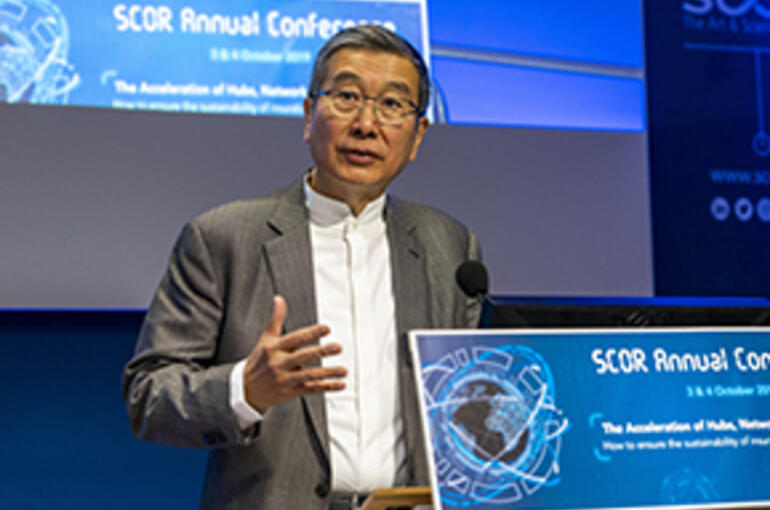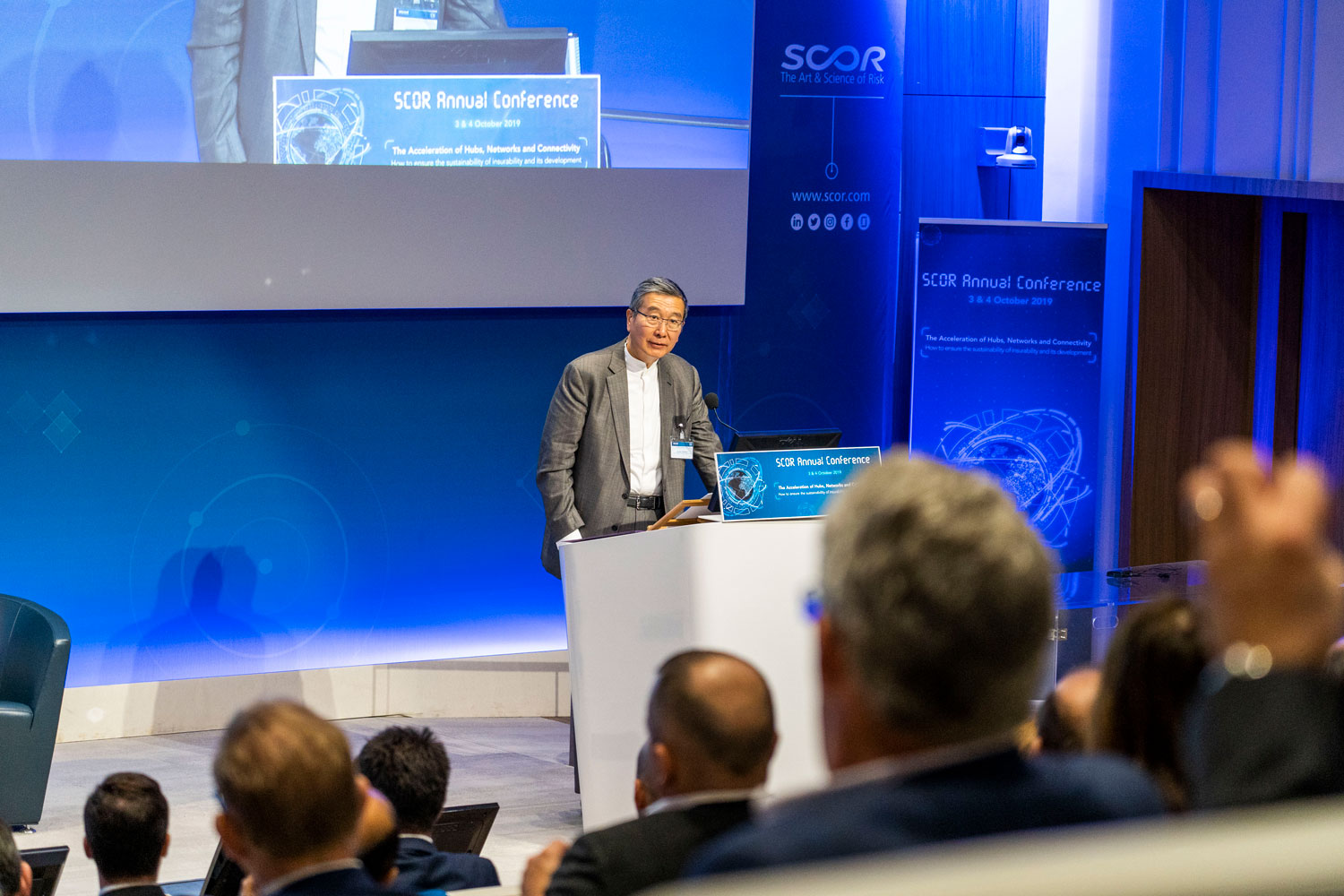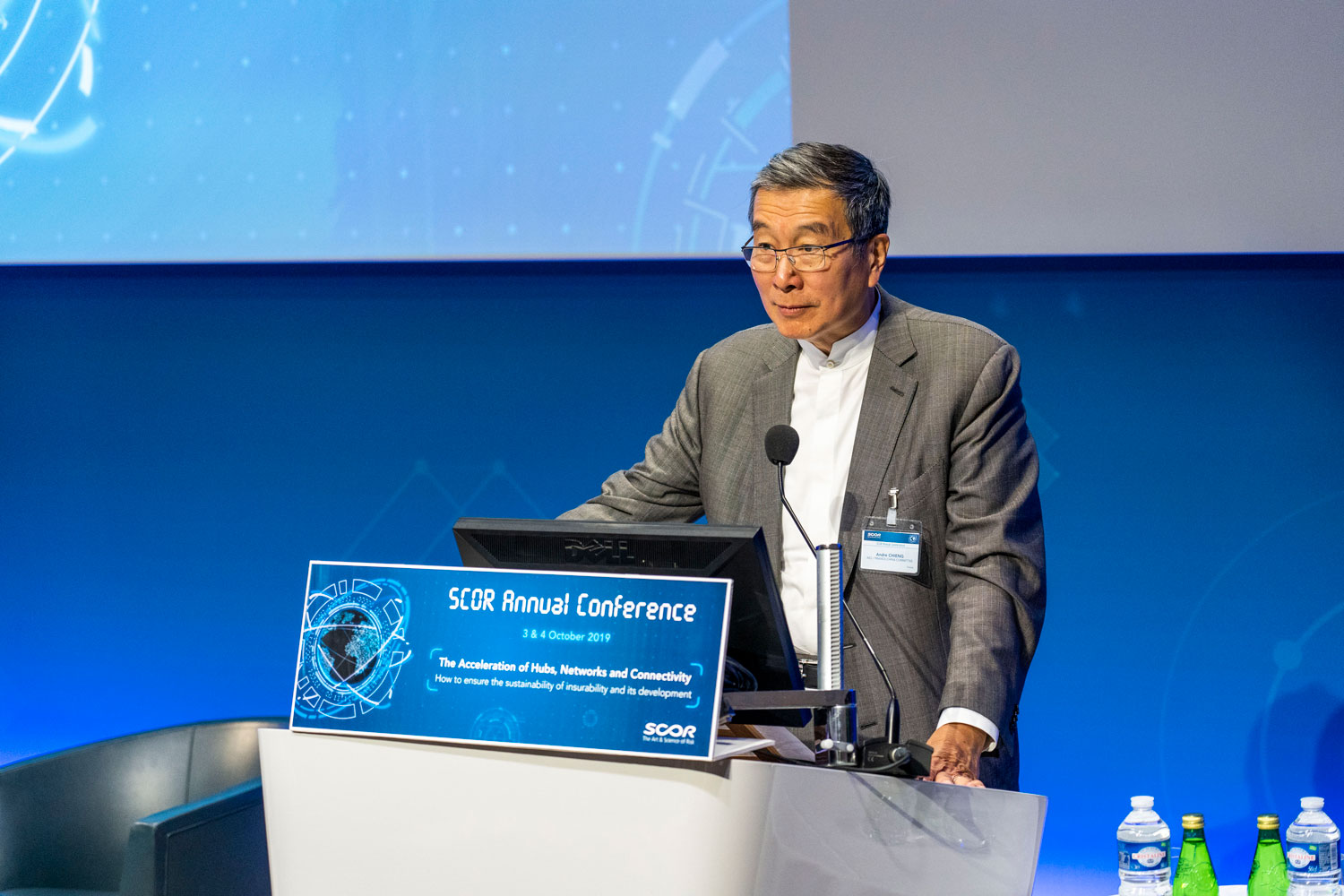The Sino-American relationship: How it will affect us all
At the 2019 SCOR Annual Conference, André Chieng, CEO of AEC, used the example of the Sino-American trade war to illustrate the intricacies of interrelationships in today’s interconnected world.
November 12, 2019

We are entering a new reality. New risks threaten us, and new technologies are emerging and developing. Compared to the industrial revolution, everything is happening much faster – and more globally.
The trade war between the US and China serves as a good example. The Sino-American relationship has become a kind of black hole in today’s geopolitics. No one really knows what it is made of and at the same time, it swallows everything it comes into contact with. It is impacting everything from the international order to the evolution of future technologies.
How can a trade war have such an impact? To begin with, it is not simply a trade war – if it were, it would have been solved immediately.
Harvard Professor Graham Allison has studied the war between Sparta and Athens in the 5th century BC. At that time, Sparta was the dominant power in Greece and when Athens began to threaten this dominance, war became inevitable.
The similarity with the current world situation is clear. American supremacy, which has prevailed since WWII, is now threatened by China. So, is war inevitable? If we follow Allison’s logic, the answer is yes – but this is not my point of view.
In the case of the Sino-American war, both leaders have read Allison and neither wants a full-on war. With the trade war, the US has initiated a kind of proxy – but the trade war is only thinly connected to trade.
The US has used the trade imbalance to justify all kinds of measures against China, the most important among them aimed at preventing China’s emergence on two major battlefields: technology and global influence. The first is illustrated by the US attacks against Huawei; the second, by its opposition to the Belt and Road initiative, which Americans consider the main vector of Chinese influence in the world today.
President Trump’s strategy is clear. He starts by taking measures that will prompt his opponent to take even more drastic ones. Then he ends up claiming victory, even if the victory is not as brilliant as he pretends.
President Trump has been much more vocal about the trade war than the Chinese. This makes China look very passive, as if it were unable to take initiative. From a Western perspective, this means, ultimately, defeat.
André Chieng, CEO of AEC
Is this really the case?
As a child, I was often told the famous Chinese story of The Three Kingdoms. It relates a famous war at the end of the second century of our era. At that time, the most powerful of the three kingdoms was the state of Wei. The two other kingdoms – Wu and Shu – were allied against Wei. The Wei army was on the northern bank of the river and the allies on the southern bank. But the allied forces had a problem: they lacked weapons – in particular arrows.
The great Shu strategist, Zhuge Liang, declared that he would supply the needed arrows in three days. The first day he was very relaxed, strolling by the river, reciting poems and singing. The second day was very much the same. On the third day, a thick fog spread over the river. Zhuge Liang immediately ordered a fleet of boats to be loaded with figures made from bales of straw. He sounded the war drums and sent the boats upriver. Believing they were under attack, the commander of the Wei forces ordered his soldiers to attack the boats. After being rained with arrows, the boats retreated, prompting the commander to declare victory. Downriver, Zhuge Liang was satisfied: he retrieved the arrows from the bales of hay, thus gathering the weapons needed to defeat the opponent.
This story summarizes several elements of a winning strategy, according to the Chinese:
1. Turn the weapons of the enemy against him.
2. Let the enemy think he has won a great victory when actually it is the reverse.
3. Choose the right moment.
André Chieng, CEO of AEC
Why did the strategist ask for three days? He needed a very important success factor – the fog. Although fog is common in those parts, Zhuge Liang didn’t know exactly when it would appear. But without it, the enemy would have realized that the boats carried bales of straw and not soldiers.
If we apply this to present Sino-American trade war:
1. The weapons are the tariffs. The US has more weapons because the US imports $500 billion worth of goods yearly from China, while China imports only $150 billion from the US. Chinese growth relies heavily on exports and because Chinese economic prosperity is the only source of legitimacy for the Chinese Communist Party, they are forced to comply with the American demands. But these weapons can be turned on their originators. Studies show that it is actually the Americans who pay most of the tariffs, either on Chinese imports directly, or on the comparatively more expensive goods they are forced to import from other countries. In reality, very few products have been relocated to the US and the trade imbalance in that country, far from decreasing, has actually increased.
2. Trump thinks he has won because so far, the American consumer hasn’t felt the impact of the increase in prices. He has placed the tariffs on products imported by American industry and the actual cost has been absorbed in the production chain. But very soon the tariffs will affect the consumer directly, as is demonstrated by the fact that Trump had to postpone some tariffs to avoid spoiling the American Christmas.
3. In my view, timing is the most crucial factor. Although the American economy seems to be flourishing, most economists predict that the country is on the eve of a recession. No one can say exactly when it will happen, but when it does the moment will be critical. It will make the positive effect of a trade deal more advantageous than China-bashing – which is now very popular not only with Trump, but in all sectors of American society. The only place this isn’t true in on Wall Street: on the world market, dips occur when the two giants clash; whenever relations relax, the market becomes bullish. Is it foolish to think that a time will come when the advantages of the economic boost provided by a deal between the US and China will override China-bashing? This is the moment China is waiting for, and I think the odds are in favor of it happening. When it does, China will let Trump claim he has won a big victory.
André Chieng, CEO of AEC
Nonetheless, don’t think that I am optimistic about the end of the war between the two countries. This is not at all the case. The fundamentals of this war are too deep and too severe to allow it to disappear instantaneously. Trump’s demands go far beyond the balance of trade, to the very core of the Chinese economic and political system. At the same time, the US can use many other weapons against China: cutting access to American technology in the name of national security, using the explosive situation in the South China sea, stirring trouble in Hong Kong, to name a few. A real peace treaty is very far away because the US will not accept to be overcome by China and China will not accept being dominated by the United States.
We should get used to the idea that the Sino-American war is going to be very, very long and multidimensional. We can only hope that it will be restricted to the world of diplomacy and will not degenerate into military confrontation.
The great Prussian strategist Clausewitz said, “War is a continuation of politics by other means.” Maybe we should modify this to say, “Diplomacy is a continuation of war by other means.”


